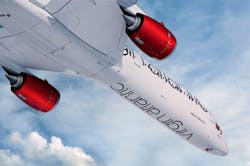Virgin Atlantic completes first long-haul flight fully powered by sustainable fuel
LONDON - The first trans-Atlantic flight using 100% sustainable aviation fuel departed London for New York on Tuesday as the industry seeks to prove the viability of greener air travel, Jenni Reid writes for CNBC. Continue reading original article.
The Military & Aerospace Electronics take:
30 November 2023 - Reuters' Reid writes that "Virgin Atlantic’s Boeing 787 burned a blend of 88% waste fats supplied by AirBP, and 12% synthetic aromatic kerosene made from plant sugars. Test flight VIR100, which did not carry paying passengers, departed London’s Heathrow Airport for New York’s John F. Kennedy International Airport at 11:49 a.m. U.K. time (6:49 a.m. ET) and landed at 2:05 p.m. ET, according to Flightradar24."
Virgin Atlantic notes that SAF represents less than 0.1% of global jet fuel volumes and fuel standards allow for just a 50% SAF blend in commercial jet engines. Flight100 will prove that the challenge of scaling up production is one of policy and investment, and industry and government must move quickly to create a thriving UK SAF industry.
The fuel mix was supplied by Virent, a subsidiary of Marathon Petroleum Corporation. The Hydroprocessed Esters and Fatty Acids (HEFA), which comprised 88% of the SAF, is made from waste fats while the SAK is made from plant sugars, with the remainder of plant proteins, oil and fibers continuing into the food chain. Synthetic Aromatic Kerosene (SAK), which comprised the remaining 12%, is needed in 100% SAF blends to give the fuel the required aromatics for engine function.
Related: Boeing, NASA, United Airlines to test sustainable aviation fuel benefits
Related: Boeing launches SAF dashboard to track sustainable aviation fuel production
Jamie Whitney, Senior Editor
Military + Aerospace Electronics
